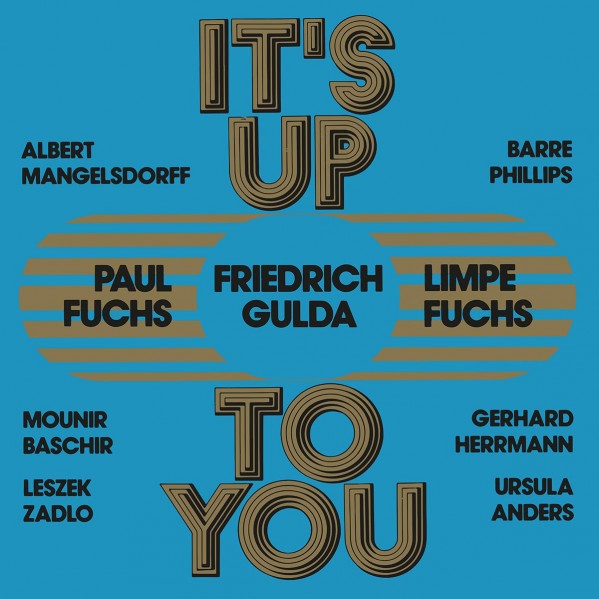-
1 Solo 1
-
2 Duo 1
-
3 Solo 2
-
4 Ensemble 1
-
5 Trio 1
-
6 Ensemble 2
-
7 Trio 2
-
8 Trio 3
-
9 Duo 2
-
10 Quartett
-
11 Trio 4
-
12 Solo 3
-
13 Solo 4
-
14 Trio 5
Friedrich Gulda (It´s Up To You, liner notes, 1974)
ENGLISH
Free Music is free. It is the opposite of traditional, conventional music bound by various rules
or by any kind of metric, tonal, harmonic, melodic, rhythmic, social or other system, as well
as music that is beholden, restricted, schooled or unfree. In short, it’s the opposite of any
music we’ve known before. In Free Music, every rule that’s ever existed in unfree music is
rejected. Likewise, all existing notions about how music should or should not be, what its
purpose must or cannot be and so on.
Free Music comes from the unconscious, an original source from within the self. It is by
placing trust in players and listeners that we liberate them. The individual’s pride, fears,
inhibitions and aggression resist this act of liberation.
But if they yield to it, whether as a player or listener, they discover something shockingly
new and unheard. They feel like they’ve suddenly been transported from their familiar,
oppressive surroundings into a glorious flower meadow. What’s happened? They’ve simply
returned home, to the realm of ordinary wonder, and to their own soul. With happiness and
gratitude, they rediscover how to connect with their soul to move, live and laugh. They also
learn that they can communicate musically with anyone, perhaps even with any creature. It
transpires that styles, traditions, conventions and languages which were developed to
enable communication are actually great impediments to it. Having decided to discard
them, communication immediately becomes freer. Until now there have been very few
players who comprehend Free Music in a profound sense and who are able to create it. But
it’s likely that their numbers will quickly grow and Free Music will soon become widespread.
There’s a clear need for it.
GERMAN
"Freie Musik ist frei. Ihr Gegenteil ist die herkömmliche, konventionelle, unterschiedlichen Traditionen verhaftete, gebundene, einem metrischen, tonalen, klanglichen, harmonischen, melodischen, rhythmischen, sozialen oder sonstigen System irgendwelcher Art auch immer verpflichtete, eingeengte, angelernte, unfreie, mit einem Wort die ganze uns bekannte bisherige Musik. In der Freien Musik sind alle Gebote oder Verbote, die in unfreier Musik Geltung hatten oder haben, außer Kraft gesetzt. Ebenso alle bisherigen Vorstellungen, wie Musik sein muß bzw. nicht sein darf, welchem Zweck sie zu dienen hat bzw. nicht dienen darf, usw. usw. Freie Musik entsteht aus dem Unbewußten, einer ursprünglichen Quelle, die aus dem Selbst kommt. Der Akt der Befreiung bei Spielern und Hörern besteht darin, sich ihr anzuvertrauen. Diesem Akt steht der Stolz des Ichs sowie seine Ängste, Hemmungen und Aggressionen entgegen.
Wer aber sich ihr anheimgibt, sei es als Spieler oder Zuhörer, betritt das Land des Unerhörten. Er fühlt sich wie einer, der plötzlich aus gewohnter, drückender Umgebung von wunderbarer Hand auf eine schöne Blumenwiese versetzt wurde. Wie geschieht ihm das? Ganz einfach: Er kehrt in seine Heimat, das Reich der ganz normalen Wunder, das Land seiner eigenen Seele, zurück. Glücklich und dankbar lernt er wieder, in ihr sich zu bewegen, zu wohnen und zu lachen. Nebstbei lernt er auch, daß er sich mit jedem Menschen, vielleicht sogar mit jedem Wesen, musikalisch verständigen kann. Stile, Traditionen, Konventionen, Sprachen, einst zur Ermöglichung der Verständigung entwickelt, entpuppen sich als deren ärgstes Hindernis. Haben sich jedoch die Kontrahenten einmal dazu durchgerungen, jene abzulegen, so entsteht im Handumdrehen ihrer Kommunikation nichts mehr im Wege. Es gibt bisher nur wenige Spieler, die Freie Musik im Tiefsten begriffen haben und folglich auch hervorbringen können. Jedoch wird ihre Anzahl zweifellos rasch anwachsen, sodaß sich die Sache schnell verbreiten wird. Denn ihre Notwendigkeit liegt in der Luft."
Credits
Bass – Barre Phillips (tracks: B1, C2, C3)
Clavichord [Electric] – Friedrich Gulda (tracks: A2, B1, B2, B4, C1, C3, C4, D3)
Drums – Gerhard Herrmann (tracks: B1, B3, C2, C3)
Drums, Vocals – Limpe Fuchs (tracks: A1, A2, C1, D3)
Harp [Fuchs] – Paul Fuchs (tracks: A3, B3, C1, D2, D3)
Horn [Fuchs] – Paul Fuchs (tracks: D3)
Oud – Munir Bashir (tracks: B1, B2)
Percussion – Leszek Zadlo (tracks: B1, B3)
Percussion [Saw, Klangblech] – Paul Fuchs (tracks: B4)
Percussion [Schilfzinken] – Paul Fuchs (tracks: B3, B4)
Piano [Electric] – Friedrich Gulda (tracks: A2, C1, D3)
Recorder [Bass] – Friedrich Gulda (tracks: D1)
Sleeve Notes – Friedrich Gulda
Soprano Saxophone – Leszek Zadlo (tracks: D3)
Trombone – Albert Mangelsdorff (tracks: B2, C3)
Vocals – Albert Mangelsdorff (tracks: B3), Barre Phillips (tracks: B3), Friedrich Gulda (tracks:
A2, B3, B4), Paul Fuchs (tracks: A3)
Zither [Fuß] – Limpe Fuchs (tracks: A1, A2, D3)
 Format: Double LP. Gold print cover. Includes liner notes and never-before-seen photographs
Format: Double LP. Gold print cover. Includes liner notes and never-before-seen photographs











